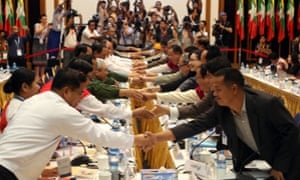Burmese government signs draft ceasefire deal with rebel groups
Agreement paves way for further peace talks with ethnic armies, but fighting in the north continues
 Members of the Burmese government and ethnic armed groups attend peace talks. Photograph: U Aung/Xinhua Press/Corbis
Members of the Burmese government and ethnic armed groups attend peace talks. Photograph: U Aung/Xinhua Press/Corbis
Associated Press in Burma-Tuesday 31 March 2015
Burma’s government and 16 ethnic armed groups have agreed the wording of a draft nationwide ceasefire agreement aimed at ending decades of civil unrest.
Though it was lauded as a significant step – the opposing sides have been tussling over words and rights to natural resources for months – the continued fighting between the army and small rebel groups along the northern frontier highlight the challenges ahead.
“I’m really happy that the two sides have finally agreed on a single draft,” said President Thein Sein, who briefly attended the signing on Tuesday. “This opens the door for political dialogue and also further peace talks.”
Minutes later, representatives from the government and 16 ethnic armed groups, including the Kachin Independence Army (KIA), signed the draft accord.
The details have not been released and it remains unclear when the final ceasefire deal will be signed.
The United Nations called the draft agreement “a historic and significant achievement” and a first step towards larger political negotiations.
“Today’s agreement is a signal that new levels of trust, confidence and cooperation are possible between former enemies and that the seeds of change in Myanmar are beginning to sprout,” Vijay Nambiar, the UN special adviser onBurma, said in a statement.
Burma stunned the world by opening up politically and economically in 2011 following elections that most rights groups say were neither free nor fair. Although Thein Sein started steering the country from half a century of dictatorship towards democracy, early reforms have either stalled or begun regressing.
That has raised the stakes of getting ceasefire deals with all ethnic armies, one of the president’s biggest pledges. Many ethnic armies have been fighting since Burma gained independence from the British in 1948, and experts say continued civil unrest is slowing development in one of south-east Asia’s poorest countries.
The KIA has been one of the most stubborn holdouts, and its signing of the draft accord is significant.
But fighting that started last month between rebels and the government in the Kokang region of Shan state continues, complicating ongoing talks. Tens of thousands of people have fled across the border to China.
The Ta’ang National Liberation Army, also in Shan state, has been refusing to sign the agreement.
